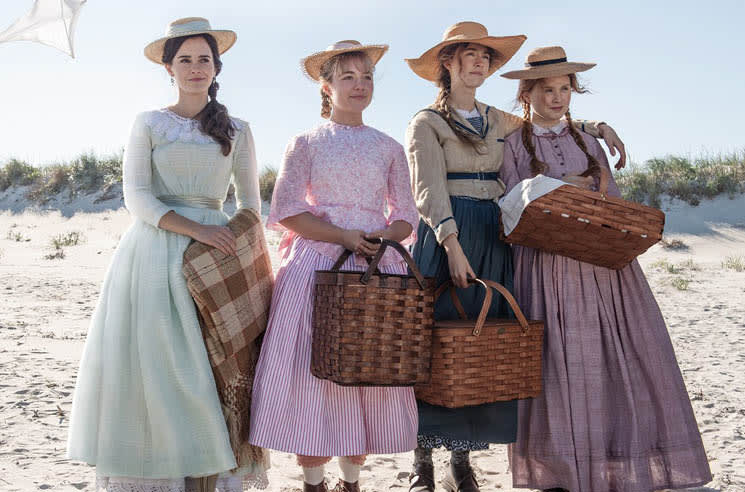After enchanting audiences with the heartfelt originality of her directorial debut Lady Bird, Greta Gerwig has turned to an American literary classic for her next film.
Her interpretation of Little Women is a gorgeous, less stuffy version of Louisa May Alcott's story. And while it has been translated to the screen multiple times, Gerwig's version proves a timely exploration of female vulnerability and power.
Though working with someone else's characters, Gerwig's strength remains eliciting emotionally relatable performances from her cast. Saoirse Ronan and Timothée Chalamet sparkle onscreen together as Jo and Laurie, one of literature's most beloved friendships (that lamentably never blooms into a romance). Ronan excellently captures Jo in all of her uncontrolled passion and emotional shortcomings, only later maturing into a compassionate and measured adult. Chalamet, meanwhile, is entirely charming as the boy next door; he weathers all of Jo's storms, making it all the more heartbreaking when he's friend-zoned by the stubborn, no-nonsense neighbour who is clearly his ideal match.
But it's Florence Pugh who steals most of the scenes she's in as Amy (even when paired onscreen with Meryl Streep's Aunt March). Bold, spoiled and hilariously cruel in the way that only youngest sisters can be, Pugh makes the character likeable onscreen and more deserving of a happy ending than she is in the novel.
As she did in Lady Bird, Gerwig gets close to the heart of mother-daughter relationships, this time given four different dynamics to play with (with Laura Dern in the role of Marmee) — not to mention the intricacies of each of the four March sisters' relationships with each other. This manifests in moments of humour, heartache, illness and eventually, at the devastating climax of the film, death. And although some American accents are noticeably not great in parts (like Emma Watson as eldest sister Meg), the emotions are, for the most part, conveyed beautifully.
It's also exciting to see Gerwig play with a period piece. Despite focusing on a family outside of the upper class during the height of the American Civil War, the costuming and set décor are still a treat to see — and that contrast makes scenes at Laurie's mansion, the debutante ball and Amy's trip to Paris even more breathtaking.
In addition to depicting the minutiae of the little women's lives and their emotional transformations, Gerwig toys with the relevance of the story in scenes capturing a grown-up Jo's conversations with an older man. After moving to New York to become a writer later in life, Jo pitches her story, Little Women, to a powerful man at a publishing house, who immediately says that a coming of age story about four young women has no appeal. He later sheepishly discovers that his own daughters are ravenous for a story like Jo's.
Despite telling a story that's been told many times over the last 150 years, Gerwig's interpretation of Little Women proves that women-told stories about the female experience will always resonate.
(Columbia)Her interpretation of Little Women is a gorgeous, less stuffy version of Louisa May Alcott's story. And while it has been translated to the screen multiple times, Gerwig's version proves a timely exploration of female vulnerability and power.
Though working with someone else's characters, Gerwig's strength remains eliciting emotionally relatable performances from her cast. Saoirse Ronan and Timothée Chalamet sparkle onscreen together as Jo and Laurie, one of literature's most beloved friendships (that lamentably never blooms into a romance). Ronan excellently captures Jo in all of her uncontrolled passion and emotional shortcomings, only later maturing into a compassionate and measured adult. Chalamet, meanwhile, is entirely charming as the boy next door; he weathers all of Jo's storms, making it all the more heartbreaking when he's friend-zoned by the stubborn, no-nonsense neighbour who is clearly his ideal match.
But it's Florence Pugh who steals most of the scenes she's in as Amy (even when paired onscreen with Meryl Streep's Aunt March). Bold, spoiled and hilariously cruel in the way that only youngest sisters can be, Pugh makes the character likeable onscreen and more deserving of a happy ending than she is in the novel.
As she did in Lady Bird, Gerwig gets close to the heart of mother-daughter relationships, this time given four different dynamics to play with (with Laura Dern in the role of Marmee) — not to mention the intricacies of each of the four March sisters' relationships with each other. This manifests in moments of humour, heartache, illness and eventually, at the devastating climax of the film, death. And although some American accents are noticeably not great in parts (like Emma Watson as eldest sister Meg), the emotions are, for the most part, conveyed beautifully.
It's also exciting to see Gerwig play with a period piece. Despite focusing on a family outside of the upper class during the height of the American Civil War, the costuming and set décor are still a treat to see — and that contrast makes scenes at Laurie's mansion, the debutante ball and Amy's trip to Paris even more breathtaking.
In addition to depicting the minutiae of the little women's lives and their emotional transformations, Gerwig toys with the relevance of the story in scenes capturing a grown-up Jo's conversations with an older man. After moving to New York to become a writer later in life, Jo pitches her story, Little Women, to a powerful man at a publishing house, who immediately says that a coming of age story about four young women has no appeal. He later sheepishly discovers that his own daughters are ravenous for a story like Jo's.
Despite telling a story that's been told many times over the last 150 years, Gerwig's interpretation of Little Women proves that women-told stories about the female experience will always resonate.




